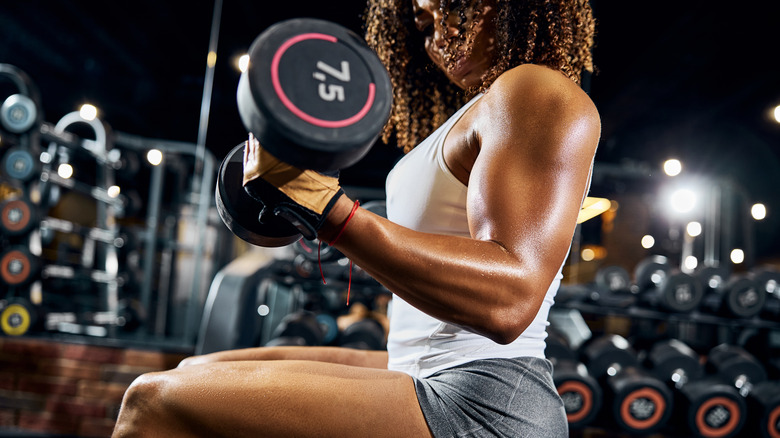Can Exercise Cause Inflammation?
Inflammation is usually associated with acute injuries, chronic stress, and certain diseases — especially those involving the immune system. Excessive drinking, smoking, and other lifestyle factors play a role, too, notes the Cleveland Clinic. If left unaddressed, acute inflammation can become chronic and take a toll on your health. Over time, it may contribute to heart disease, type 2 diabetes, arthritis, cancer, and neurodegenerative ailments.
Some people experience inflammation after exercise, which may seem strange. After all, physical activity is supposed to reduce inflammatory markers in the body. For example, evidence published in the journal Brain, Behavior, and Immunity shows that working out for just 20 minutes may improve immune function and decrease inflammation. In clinical trials, aerobic exercise has been shown to reduce C-reactive protein, interleukin-6, and tumor necrosis factor-alpha levels (via a 2019 study published in Frontiers in Aging Neuroscience). These compounds are directly involved in the inflammatory process and may lead to disease when secreted in excess. That said, you can still have muscle pain, swelling, or other signs of inflammation following a tough workout — and there's an explanation for it.
The complex relationship between exercise and inflammation
Exercise, especially resistance training, causes trauma to your muscles. When that happens, your immune cells secrete cytokines, explains the University of New Mexico. These pro-inflammatory proteins stimulate the release of lymphocytes and other types of cells that are sent to the injured area to repair damaged tissues. This sequence of events causes acute inflammation.
Long, intense workouts cause more trauma to your muscles and tissues, inducing a greater inflammatory response. As a result, they carry a higher risk of injury and can lead to chronic inflammation (via Frontiers in Physiology). Aerobic exercise appears to have a less pronounced effect. As health coach Michelle Cady told mindbodygreen, "HIIT or heavy strength-training workouts like CrossFit, powerlifting, and Olympic lifting cause the most inflammation and tiny microtears in your muscles." The same goes for long-distance running or cycling, she added.
Cady notes that exercise-induced inflammation isn't necessarily a bad thing. This process contributes to hypertrophy, or muscle growth, and can help you achieve your fitness goals. "In this case, inflammation is one of the earliest stages of the recovery process to building a stronger, fitter, leaner body," explains Cady. A balanced diet and adequate rest can speed up recovery and tame the inflammatory response. Poor nutrition and sleep deprivation have the opposite effect on recovery (via mindbodygreen).
How to deal with exercise-induced inflammation
Dealing with exercise-induced inflammation can be nerve-racking, especially for regular gym-goers. You want to keep up with your training routine, but your whole body is aching. Endurance coach Matt Fitzgerald told Active that many athletes simply don't have enough time to recover between workouts, which can lead to chronic inflammation and joint problems. The best thing you can do to reduce muscle damage is to gradually increase workout intensity and other training variables, says Fitzgerald.
The Collegiate and Professional Sports Dietitians Association (CPSDA) recommends filling up on protein, omega-3s, vitamin D, and antioxidants. These nutrients can mitigate exercise-induced inflammation and muscle damage, leading to faster recovery. Ideally, consume 20 to 30 grams of protein after training and 1 to 3 grams of omega-3 fatty acids per day. You may also try tart cherry juice, a natural beverage with antioxidant and anti-inflammatory effects. High-nitrate foods, such as beets and leafy greens, can aid in recovery, too.
Proper rest is just as important as diet and exercise, as it supports muscle growth and repair, metabolic health, and immune function. Even one night of bad sleep can increase inflammation and alter the immune response, suggests a 2008 study featured in Biological Psychiatry (via Elsevier). "Getting enough sleep can not only give you more drive and strength to maximize your workout, but its effects on concentration, mood, and focus can make you more efficient and better prepared for that workout," notes neurologist W. Christopher Winter (via Everyday Health).



